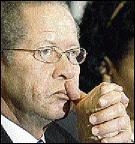
Golding
Prime Minister Bruce Golding has pledged to take a 15 per cent pay cut and called on his colleague members of parliament to sacrifice 10 per cent of their salaries as the Government prepares to table what promises to be one of the most difficult budgets in recent memory.
In an address to the nation last night, Golding reiterated that the Government had been forced to take tough decisions as it crafted the 2009-2010 Budget within the atmosphere of a global economic meltdown.
"When the debate is held, we will outline the tough choices we have had to make and why we had to make them," the prime minister said.
Lead by example
In announcing his decision to take a cut in his $5,412,295.60 salary, he stressed that "those of us who lead will have to lead by example".
"Last year, I announced that parliamentary salaries would be tied to those of public-sector workers. In other words, parliamentarians can no longer give themselves salary increases higher than that granted to public-sector workers," Golding said.
"This year, not only am I foregoing the seven per cent increase that would have been due on April 1, but I will be taking a 15 per cent cut in my salary and I ask all members of parliament to join in this symbolically important example by taking a 10 per cent cut in theirs."
After becoming prime minister in September 2007, Golding received a salary of $4,706,344, which was subsequently increased by 15 per cent, in line with public-sector workers. Golding's pay cut will shrink his salary to its original level.
Last night, Dwight Nelson, minister without portfolio in the Ministry of Finance and the Public Service, said all members of parliament from the governing Jamaica Labour Party administration have agreed to take the 10 per cent pay cut requested by the prime minister. If all 60 MPs move to the PM's beat, the overall reduction in parlia-mentary salaries would amount to about $20 million in savings for the Government.
Golding's admittedly symbolic gesture came after he acknow-ledged that among the tough choices the Government had to make was freezing public-sector wages at the levels which obtained on March 31. This means public-sector workers will have to forego the increases due this year.
Golding stressed that the only other option would have been to lay off thousands of workers at a time when alternative employment was difficult to find.
He noted that accommodation would have to be found for some categories of workers, such as nurses, who did not benefit from the increases granted last year.
The prime minister explained that apart from interest payments which have to be met, the government payroll is, at more than $100 billion, the greatest charge on the public purse.
Golding also noted that while there were areas from which cuts would have to be made because of the anaemic economic environment, other critical portfolios would require more spending, not less.
"We can't cut back what we are spending to educate our children, fight crime, provide health care and assist the pensioners and the very poor," the prime minister said.
PM gets taste of own medicine

Golding
Estimated figures
| Parliamentarians | Basic | Salary after |
| Salary | pay cut | |
| Prime Minister | $5,412,295.6 | $4,706,344 |
| Deputy Prime Minister | $4,736,266.95 | $4,262,640 |
| Minister of Finance | $4,385,055.80 | $3,946,550 |
| Cabinet Minister | $4,060,237.15 | $3,654,213 |
| Speaker of the House | $3,806,472.40 | $3,425,825 |
| Minister of State | $3,552,707.65 | $3,197,436 |
| Leader of the Opposition | $3,552,707.65 | $3,197,436 |
| Parliamentary Secretary | $3,045,178.15 | $2,740,660 |
| Deputy Speaker | $3,045,178.15 | $2,740,660 |
| Member of Parliament | $2,537,648.65 | $2,283,883 |
Do you agree with the idea of the prime minister and other MPs cutting their pay?
Email: editor@gleanerjm.com